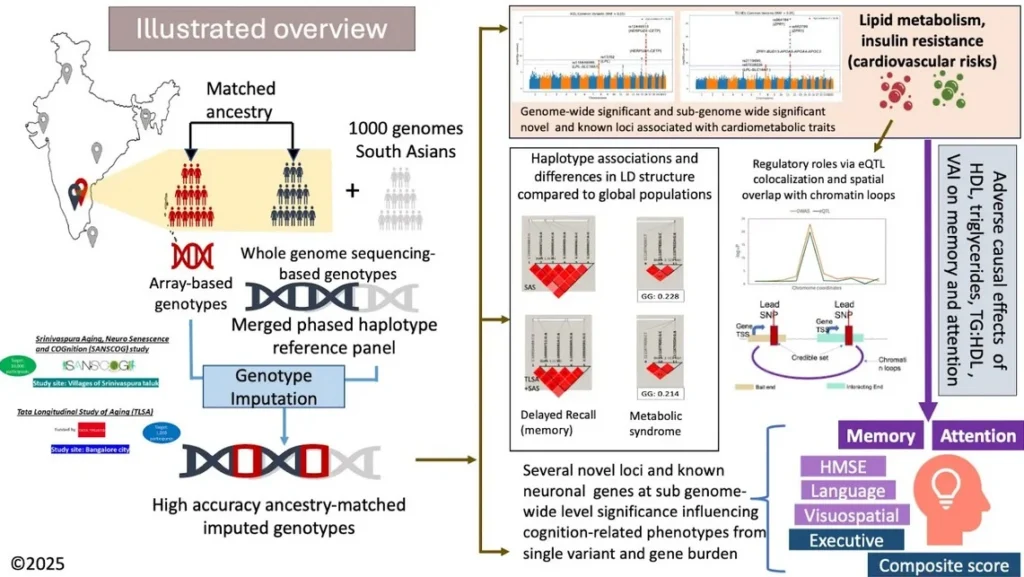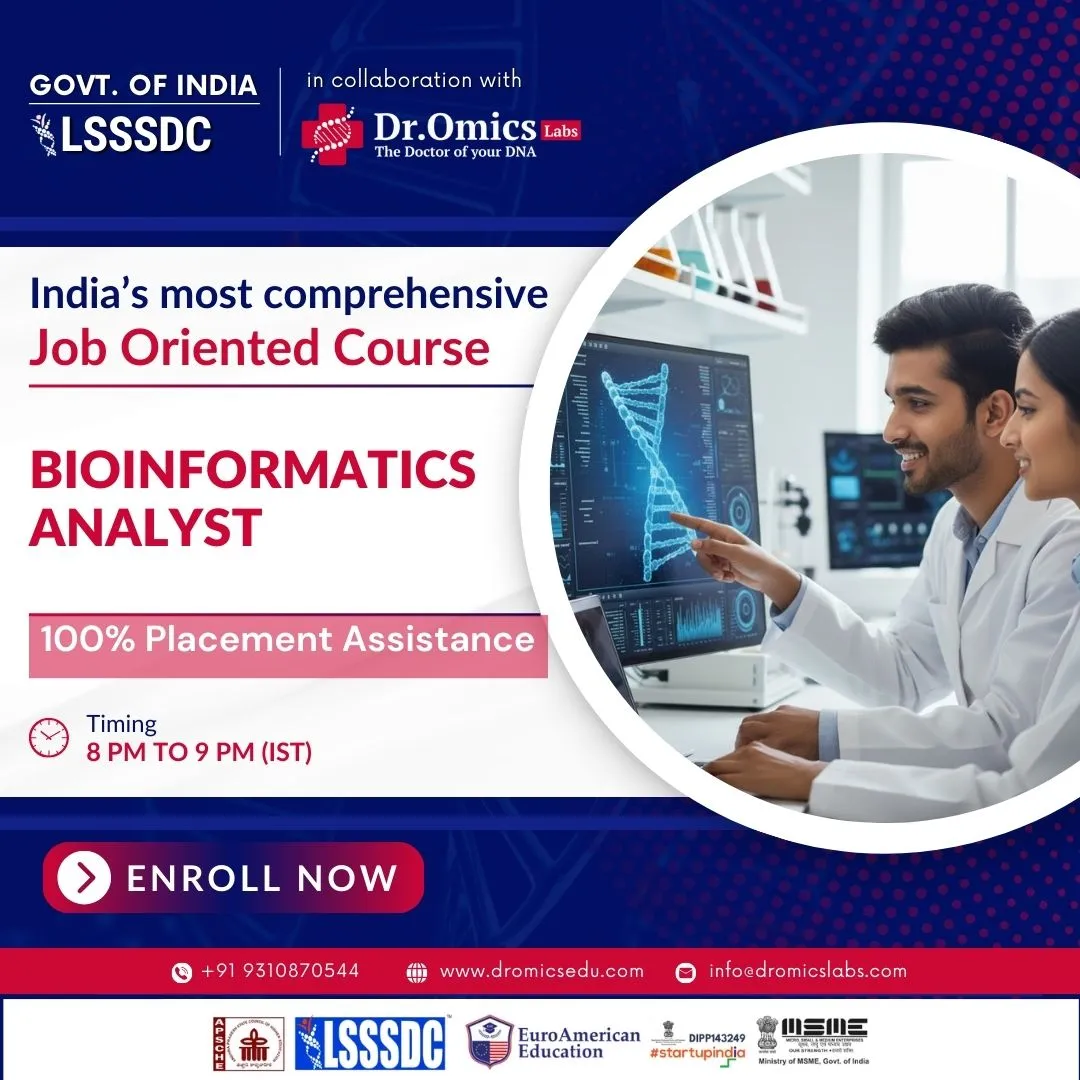Research Summary: This first-of-its-kind study identifies both known and novel variants influencing cognition and metabolic traits in rural Indian populations, offering the first causal evidence linking lipid metabolism to domain-specific cognitive outcomes.
Author interview

Shreya Chakraborty is a joint PhD student between Interdisciplinary Mathematical Sciences and Centre for Brain Research, IISc Bangalore studying the genetic basis of complex traits like cognitive functioning and cardiometabolic risks.
Linkedin: www.linkedin.com/in/shreya-chakraborty-9205a0171
Twitter: @ShreyaC111
Lab: Dr. Bratati Kahali, Centre for Brain Research, IISc Bangalore
Lab social media: https://cbr-iisc.ac.in/bratati-kahali/ ; @BratatiKahali
What was the core problem you aimed to solve with this research?
Epidemiological studies suggest links between cardiometabolic and cognitive traits, but causal connections are not yet established, especially in rural, health-disparate populations. Our study aimed to determine whether such causal links exist in rural South Indian cohorts with varying cardiometabolic risk using advanced genetic measures. Given the socioeconomic challenges, worsening cardiometabolic health could increase the burden of cognitive decline in these communities.

How did you go about solving this problem?
To address this problem, we collected genetic data and health information from a large group of people (5000+) living in rural South India. We then
- Created a reference haplotype-panel for genomic imputation specific to this population to improve the accuracy of genetic analysis.
- Analyzed the genetic variants linked to both cognitive traits (like memory and attention) and metabolic traits (like cholesterol and insulin resistance).
- Used statistical methods, including Mendelian randomization, to test whether metabolic factors cause changes in cognitive function.
- Interpreted the results to identify specific genes and biological pathways that connect metabolism to brain health.
Shreya’s current work employing statistical analysis, cautious resource development is really advancing how we understand complex traits in underrepresented groups. — Dr. Bratati Kahali
How would you explain your research outcomes (Key findings) to the non-scientific community?
Our research helps us understand how genes influence both mental abilities (memory, attention) and heart and metabolic health, such as cholesterol, insulin resistance, and body fat around the organs. Most research so far has focused on people from other parts of the world and those with better economic conditions. We studied 5000+ rural people living in Srinivaspura Taluk, Kolar, Karnataka. We find that issues like insulin resistance and excess body fat can directly impact how well the brain works. To explain with an example: we compare two groups of people, one with genes that naturally raise cholesterol (higher-risk) and one without (lower-risk) and see if there’s a difference in their thinking or memory skills. Since genes are randomly assigned at birth, it’s as if nature uses genetics to conduct its own experiment, thereby letting us test whether high cholesterol causes cognitive problems without needing to give anyone cholesterol pills. Furthermore, we identified genes in this community that impact metabolic health and brain function, both known and previously unknown. Our work helps explain why poor heart and metabolic health, which is becoming more common, might lead to memory and thinking problems as people get older. And since metabolic health can be modulated with lifestyle changes and interventions, we can take such steps to preserve our cognitive well-being (memory, attention) during aging.
What are the potential implications of your findings for the field and society?
Our research has highlighted direct causal links between cardiometabolic risk factors like high triglyceride levels, high insulin resistance and memory and attention. This means targeting these factors through lifestyle changes or medications could maintain cognitive functioning during aging. By catching cardiometabolic risks early and intervening, we could significantly reduce the societal burden of dementia and cognitive decline. Also, an ancestry-matched reference panel boosts accuracy in variant prediction for non-European population groups, thus bridging the health-equity gap and making genetic research more inclusive.
What was the exciting moment during your research?
What really excited us was finding clear causal connections between cardiometabolic factors like elevated triglycerides and insulin resistance and cognitive functions such as memory and attention. That is huge considering our small sample size. Uncovering causal evidence using genetic data is never straightforward, so replicating known hits and identifying novel ones was incredibly validating. It speaks to the strength of our study design and analytical methods. We also achieved higher imputation accuracy by using a newly developed, ancestry-matched haplotype reference panel, which helped ensure more reliable variant predictions in underrepresented populations. To prioritize robustness, we focused on hits with lower standard errors even when other regions showed interesting signals. Overall, these findings make us really optimistic about where human genetics is going, especially with the increasing availability of diverse and deep-phenotyped datasets.”
Paper reference: Chakraborty S, Subramanian K, Rajesh A, et al. Genome-wide study links cardiometabolic factors to cognition via APOA4-APOA5-ZPR1-BUD13 and other loci in rural Indians. Alzheimer’s Dement. 2025; 21:e70429. https://doi.org/10.1002/alz.70429
Explore more
🎤 Career – Real career stories and job profiles of life science professionals. Discover current opportunities for students and researchers.
💼 Jobs – The latest job openings and internship alerts across academia and industry.
📢 Advertise with BioPatrika – Reach the Right Audience, Fast!
🛠️ Services – Regulatory support, patent filing assistance, and career consulting services.




